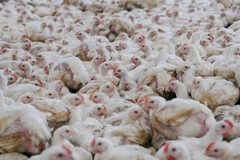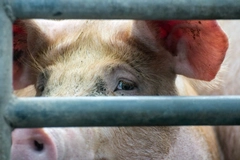
- Industry news
Industry news
- Category news
Category news
- Reports
- Key trends
- Multimedia
- Journal
- Events
- Suppliers
- Home
- Industry news
Industry news
- Category news
Category news
- Reports
- Key trends
- Multimedia
- Events
- Suppliers
COP30: FARMS Initiative launches protein shift standards for plant-forward financing
Key takeaways
- The FARMS Initiative released new standards at COP30 to guide financial institutions toward plant-based protein investments.
- Animal agriculture reportedly generates 16.5% of GHG emissions — equal to all transport combined.
- The Protein Shift RMS outlines four core actions for financial institutions: public acknowledgement, measurable targets, capital reallocation, and progress reporting.

A coalition of animal welfare organizations has introduced a set of “minimum standards” at the UN Climate Change Conference (COP30) in Brazil to guide financial institutions toward plant-based protein investments.
The FARMS Initiative, comprising Humane World for Animals, World Animal Protection, and Compassion in World Farming, released its Responsible Minimum Standards (RMS) for the Protein Shift at an official COP30 side event yesterday.
RMS outlines practical steps for managing risks and opportunities related to the management of animals and their transportation and slaughter, as well as the transition of food systems toward more sustainable and diversified protein sources. It also addresses climate, biodiversity, and public health risks while supporting what the coalition describes as a just transition toward sustainable protein sources.

The framework is intended to encourage financial institutions to realign portfolios away from intensive animal agriculture and toward plant-forward food systems.
Animal agriculture accounts for at least 16.5% of human-induced GHGs — equivalent to all forms of transportation combined, according to the coalition. Globally, over 94 billion terrestrial animals are farmed and slaughtered annually for food, and the sector ranks among the leading causes of deforestation, biodiversity loss, and antimicrobial resistance.
Creating financial incentives
The Protein Shift standards outline four core opportunities for financial institutions. These include public acknowledgement that shifting from animal-based to plant-based proteins is essential for climate and biodiversity goals, setting measurable targets aligned with net-zero pathways, reallocating capital away from intensive animal agriculture, and publicly disclosing progress on protein shift objectives.
“Animal agriculture is a major contributor to the climate, nature, and health crises we face,” says Kelly Dent, director of external engagement at World Animal Protection. “The Protein Shift RMS helps financial institutions manage these risks and invest in food systems that are better for animals, people, and the planet.”
The standards encourage institutions to focus engagement on companies with genuine transition potential while avoiding investments in practices that perpetuate unsustainable systems, such as large-scale biomethane or insect feed production for industrial animal agriculture operations.
They represent the second set of standards from the FARMS Initiative, following the previous release of its Animal Welfare RMS.
Driving the protein shift
Peter Stevenson, chief policy advisor at Compassion in World Farming, says major reductions in meat consumption in upper- and middle-income countries are necessary to avoid climate disaster.
“Financial institutions must help finance a move to flexitarian diets containing protein-rich plants such as beans and soy products,” he says.
“They should also fund the development of precision fermentation, which the UN FAO notes is paving the way for food industry transformation.”
Jackie Groberski, director of corporate and financial institution engagement at Humane World for Animals, says financial institutions play a pivotal role in shaping the future of food.
“By adopting the Protein Shift RMS, institutions can take practical, credible steps to finance the future of plant-forward food systems, aligning with global sustainability goals while advancing animal welfare, encouraging the necessary shift to more planet-friendly plant-proteins and ultimately improving food security for all,” she says.
The standards reference the EAT-Lancet recommendations of shifting toward a predominantly plant-based eating pattern for sustainable diets. Reducing financial exposure to animal-based proteins is critical to achieving the UN Paris Agreement’s goal of limiting global warming to well below 2°C, the coalition says.
















